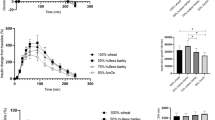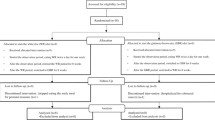Abstract
Background
Barley reportedly reduces postprandial hyperglycemia in healthy individuals. However, its effects in patients with type 2 diabetes mellitus (T2DM) undergoing antidiabetic therapy remains unclear. This study aimed to clarify the effects of barley intake on postprandial hyperglycemia in T2DM patients who use metformin or acarbose.
Methods
T2DM patients who were undergoing dietary therapy without medications (naive), with metformin, or with acarbose (n = 10/group) were recruited. They were instructed to eat white rice twice per day for 5 days, followed by barley-mixed rice twice per day for 6 or 7 days. Subsequently, blood glucose fluctuations in the interstitial fluid glucose were measured using a continuous glucose monitoring device. Meal tolerance tests were performed using test diets containing white rice and barley-mixed rice before and after the trial, respectively.
Results
Postprandial hyperglycemia was lower in patients taking barley-mixed rice than in those taking white rice in each group. However, the AUC of blood glucose concentration in the acarbose-treated patients showed only a trend. Mean amplitude of glycemic excursions (MAGEs) decreased in patients who consumed barley-mixed rice. Additionally, although MAGEs in the naive decreased, it did not in the metformin- (P = 0.098) and acarbose-treated (P = 0.29) patients.
Conclusion
Barley-mixed rice lowers postprandial glucose concentrations in treatment-naive and metformin-treated T2DM patients, and shows a trend in acarbose-treated patients. Therefore, using barley-containing diets as dietary therapy may be useful in improving glycemic control in diabetes patients.
Trial registration
UMIN000028623.




Similar content being viewed by others

Data availability
Supplemental materials are available from the Online Supplemental Material. Data described in the manuscript, code book, and analytic code will be made available after approval of our request.
References
Patel V. Diabetes mellitus: the disease. Diabetic eye disease, Japan diabetes society 2016th–2017th edition. New York: Elsevier; 2000. p. 1–24.
Oizumi T, Daimon M, Jimbu Y, Wada K, Kameda W, Susa S, Yamaguchi H, Ohnuma H, Tominaga M, Kato T. Impaired glucose tolerance is a risk factor for stroke in a Japanese sample-the Funagata study. Metabolism. 2008;57:333–8.
DECODE Study Group, European Diabetes Epidemiology Group. Glucose tolerance and mortality: comparison of WHO and American Diabetes Association diagnostic criteria. Lancet. 1999;354:617–21.
Chiasson JL, Josse RG, Gomis R, Hanefeld M, Karasik A, Laakso M, STOP-NIDDM Trial Research Group, STOP-NIDDM Trial Research Group. Acarbose treatment and the risk of cardiovascular disease and hypertension in patients with impaired glucose tolerance: the STOP-NIDDM trial. JAMA. 2003;290:486–94.
Hanefeld M, Cagatay M, Petrowitsch T, Neuser D, Petzinna D, Rupp M. Acarbose reduces the risk for myocardial infarction in type 2 diabetic patients: meta-analysis of seven long-term studies. Eur Heart J. 2004;25:10–6.
Liu S, Willett WC, Stampfer MJ, Hu FB, Hu FB, Franz M, Sampson L, Hennekens CH, Manson JE. A prospective study of dietary glycemic load, carbohydrate intake, and risk of coronary heart disease in US women. Am J Clin Nutr. 2000;71:1455–61.
Fung TT, Hu FB, Pereira MA, Liu S, Stampfer MJ, Colditz GA, Willett WC. Whole-grain intake and the risk of type 2 diabetes: a prospective study in men. Am J Clin Nutr. 2002;76:535–40.
Foster-Powell K, Holt SHA, Brand-Miller JC. International table of glycemic index and glycemic load values. Am J Clin Nutr. 2002;76:5–56.
Sun Q, Spiegelman D, van Dam RM, Holmes MD, Malik VS, Willett WC, Hu FB. White rice, brown rice, and risk of type 2 diabetes in US men and women. Arch Intern Med. 2010;170:961–9.
Sakuma M, Yamanaka-okumura H, Naniwa Y, Matsumoto D, Tsunematsu M, Yamamoto H, Taketani Y, Takeda E. Dose-dependent effects of barley cooked with white rice on postprandial glucose and desacyl ghrelin levels. J Clin Biochem Nutr. 2009;44:151–9.
Higa M, Fuse Y, Miyashita N, Fujitani A, Yamashita K, Ichijo T, Aoe S, Hirose T. Effect of high β-glucan barley on postprandial blood glucose levels in subjects with normal glucose tolerance: assessment by meal tolerance test and continuous glucose monitoring system. Clin Nutr Res. 2019;8:55–63.
Bouza C, López-Cuadrado T, Gutierrez-Torres LF, Amate J. Efficacy and safety of metformin for treatment of overweight and obesity in adolescents: an updated systematic review and meta-analysis. Obes Facts. 2012;5:753–65.
Han Y, Xie H, Liu Y, Gao P, Yang X, Shen Z. Effect of metformin on all-cause and cardiovascular mortality in patients with coronary artery diseases: a systematic review and an updated meta-analysis. Cardiovasc Diabetol. 2019;18:1–16.
Kobayashi T, Kaneko S, Matsuoka T. The effect of barley noodles on blood sugar levels in type 2 diabetes patients. J Japanese Assoc Diet Fiber Res. 2013;17:35–40.
Matsuoka T, Uchimatsu D, Kobayashi T, Aoe S. Effect of barley on metabolic syndrome related indicators in overweight Japanese men and women. J Japanese Assoc Diet Fiber Res. 2014;18:25–33.
Aoe S, Ichinose Y, Kohyama N, Komae K, Takahashi A, Abe D, Yoshioka T, Yanagisawa T. Effects of high β-glucan barley on visceral fat obesity in Japanese individuals: a randomized, double-blind study. Nutrition. 2017;42:1–6.
Aoe S, Ikenaga T, Noguchi H, Kohashi C, Kakumoto K, Kohda N. Effect of cooked white rice with high β-glucan barley on appetite and energy intake in healthy Japanese subjects: a randomized controlled trial. Plant Foods Hum Nutr. 2014;69:325–30. https://doi.org/10.1007/s11130-014-0437-6.
Halimi S, Le Berre MA, Grangé V. Efficacy and safety of acarbose add-on therapy in the treatment of overweight patients with Type 2 diabetes inadequately controlled with metformin: a double-blind, placebo-controlled study. Diabetes Res Clin Pract. 2000;50:49–56. https://doi.org/10.1016/S0168-8227(00)00163-7.
Acknowledgements
We would like to thank Dr. Hidekazu Maejima of Nagano Agricultural Experiment station, and Yoshiaki Okamoto and Fumitaka Kikuchi of JA Kamiyotsuba Radfa for providing us with the test foods. We would also like to thank the support staff at Naka Kinen Clinic. This study was funded by Hakubaku Co. Ltd.
Author information
Authors and Affiliations
Contributions
TO, TM, KO, TK, and KM conceived and designed the research. TO and KO collected samples. TM and KM performed the statistical analysis. TO, TM, MK, TK, and KM interpreted the data. TO, TM, and KM prepared the manuscript. All the authors reviewed the final manuscript.
Corresponding author
Ethics declarations
Conflict of interest
TM and TK are employees of Hakubaku Co. Ltd. The remaining authors declare no conflict of interest.
Ethics approval
This study was conducted according to the guidelines laid down in the Declaration of Helsinki, and all procedures involving human participants were approved by the Ethics Review Committee of the Naka Kinen Clinic (Approval No. HB-01, 2017/7/25); the protocol was registered at the University hospital Medical Information Network Centre clinical trial registry (Registry No. UMIN000028623, 2017/8/10). All the participants provided their informed consent prior to their inclusion in the study.
Additional information
Publisher's Note
Springer Nature remains neutral with regard to jurisdictional claims in published maps and institutional affiliations.
Supplementary Information
Below is the link to the electronic supplementary material.
About this article
Cite this article
Osonoi, T., Matsuoka, T., Ofuchi, K. et al. Effects of barley intake on glycemic control in Japanese patients with type 2 diabetes mellitus undergoing antidiabetic therapy: a prospective study. Diabetol Int 13, 387–395 (2022). https://doi.org/10.1007/s13340-021-00552-z
Received:
Accepted:
Published:
Issue Date:
DOI: https://doi.org/10.1007/s13340-021-00552-z



